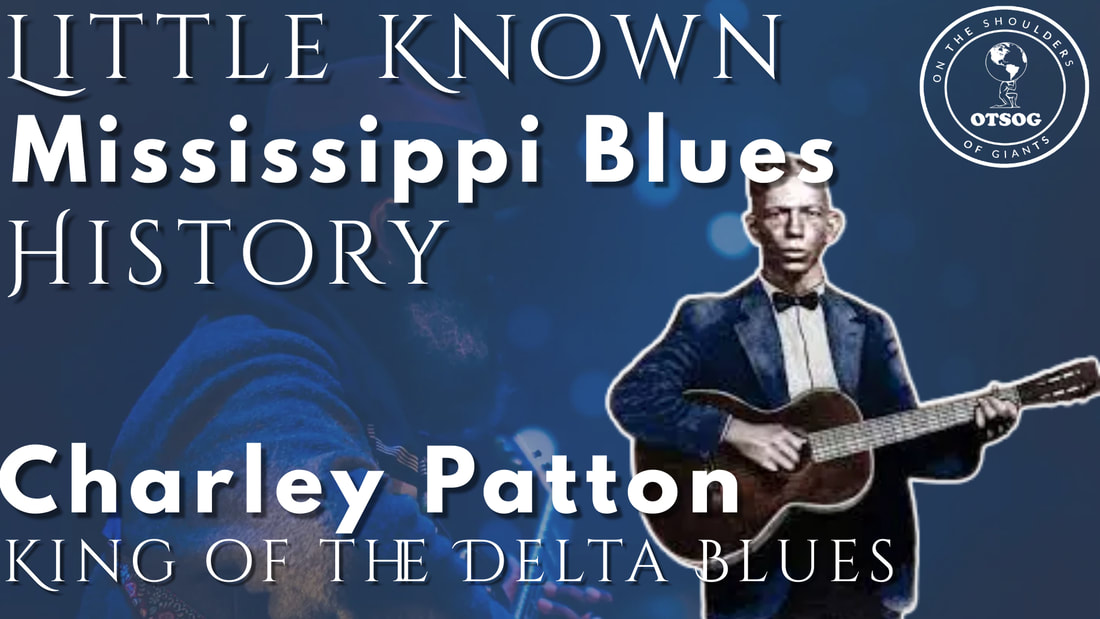|
The blues is one of America’s oldest, most prominent, and alluring forms of music. The blues was created by black Americans who were formerly enslaved, but still lived in oppressive conditions. It was a form of musical expression that portrayed the raw emotions black Americans expressed, because of the conditions they lived in. Charley Patton was born in April of 1891, in Hinds County, Mississippi, but was raised in Sunflower County, Mississippi, within the Mississippi Delta. Bill and Annie Patton were Charley’s parents; though many believed that Patton’s father was a man named Henderson Chatman, a formerly enslaved black man who fathered many musicians. Charley Patton was 5’5 tall, fair-skinned, and believed to be of black American and Native American ancestry. Stories exist about Patton being of Cherokee or Choctaw tribes, the Cherokee claim is believed because Patton made the song “Down in the Dirt Road Blues” about visiting the Cherokee tribe. 1897 was the year the Patton family moved from Sunflower County, Mississippi to the Dockery Plantation in Ruleville, Mississippi. Moving to Ruleville, Mississippi would prove to be a pivotal decision in Patton’s life. Henry Sloan is the name of a legendary Mississippi Delta musician and the man that influenced Charley Patton’s style of music. Henry Sloan created the foundation for what we know as Mississippi Delta Blues. Patton learned a lot about music and Mississippi Delta Blues from Sloan, soon after, Patton was making a name for himself within the Mississippi Delta. He quickly became one of the most talented and popular blues artists in the delta. He would travel from plantation to plantation performing and gaining notoriety. We would begin to forge friendships with fellow delta blues legends such as Howlin’ Wolf, Willie Brown, Fiddlin’ Joe Martin, Tommy Johnson, and Robert Johnson. Because he was older than these musicians he would become a mentor to them. Patton’s talent and popularity grew to where he was invited to perform all over the South, New York, Chicago, and throughout the United States. His performance schedule was unusual at the time for a delta blues player because he had consistent scheduled performances. A performance schedule that others would soon adopt. Patton was a very talented musician, not only was he a master at playing Mississippi Delta Blues, but he could also masterfully play various genres of music including ballads and what was considered “hillbilly songs”. Showmanship is an attribute that was used to describe Patton as a performer. While playing the guitar, Patton would dramatically drop to his knees, then swing the guitar behind his head and back, continuing to play effortlessly, as the crowds roared in amazement. Many believe Patton created the foundation for Rock & Roll. Patton’s influence could be heard and seen in the way the delta musicians and musicians of other genres played their chords and their stage presence, some mimicking Patton’s dance moves and guitar swinging. Patton’s voice was very influential as well. It is said that Patton's voice could be heard from 500 yards away with no microphone. A number of people believe he influenced the way Howlin’ Wolf used his voice. In 1933, Patton and his common-law wife Bertha Lee moved to Holly Ridge, Mississippi. Their relationship was not healthy, they were combative with each other, which resulted in them being incarcerated. Patton’s career was not as long and successful as it should have been, due to the way black artists were exploited during the early 1900s. His final recording session was from January through February of 1934. He would die on April 28th, 1934 of a heart condition. Patton’s death was not reported by any news outlets, and his legacy was all but forgotten until his music and legacy were rediscovered. But his influence was already imprinted on the music industry. Considered the “father of the Delta Blues”, Charley Patton was responsible for contributing to over 54 music recordings between 1929 and 1934. Patton’s Screamin' and Hollerin' the Blues: The Worlds of Charley Patton was packaged and rereleased to the public in 2001, winning 3 Grammy awards in 2003. In 2006, Patton’s song “Pony Blues” was added to the National Recording Preservation Board of the Library of Congress. The documentary American Epic was released in 2017, depicting Patton's life. He was inducted into the Blues Hall of Fame in 2006, and the Rock and Roll Hall of Fame in 2021. This is the story of Mr. Charley Patton, the world of music stands on your shoulders. J.A. Ward Click here to support the OTSOG book series. References: https://en.wikipedia.org/wiki/Charley_Patton https://www.elijahwald.com/patton.html https://aaregistry.org/story/charlie-patton-born/ https://www.blackpast.org/african-american-history/patton-charley-1891-1934/ https://www.elijahwald.com/patton.html
1 Comment
Samuel Poe
9/25/2023 12:20:26 pm
Patton was a musical genius. He may have learned his way of playing guitar from Sloan yet Hawaiian Music was the rage when he was a teenager.
Reply
Leave a Reply. |
Details
Categories
All
Click Here to join our mailing list
|
Contact Us: |
Connect With Us |
Site powered by PIT Web Design


 RSS Feed
RSS Feed



